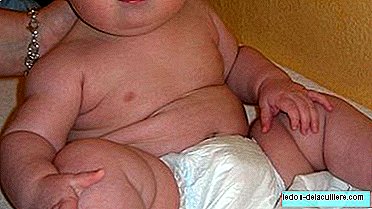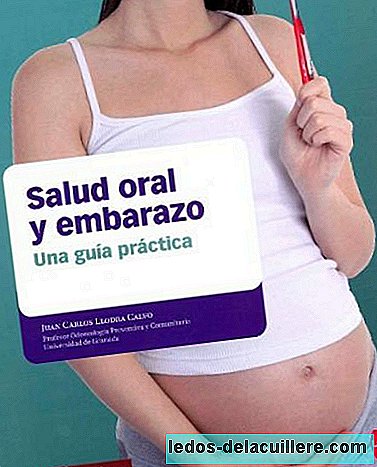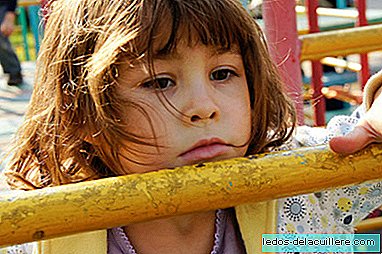
Children usually begin to lie in preschool age, between two and four years, being a cause for concern for some parents who think that these deliberate attempts to deceive are a sign that their child will end up becoming a little rascal.
But nevertheless, lying is a normal part of a child's development and one of the first indications that he has developed a "theory of mind": the ability to be aware that other people have desires, feelings and beliefs different from their own. When a child says deceptively that "Dad said he could eat ice cream" he is using this awareness of the minds of others to sow doubt.
Although lying may not be desirable at the social level, the ability to know what other people think and feel is a very important social skill, since it helps us empathize, cooperate and care for others when they are having a hard time. .
The way of lying changes with age
The first lies of young children are usually rather funny and ineffective. Think of a child who says he has not eaten cake when he still has his mouth full or blames the family dog for the drawings on the walls. Young children may be aware that they can fool others, but they are still not quite right.
Before the age of eight, Children often give themselves away when they lie. In one study, children between three and seven years were asked not to take a look at a mysterious toy (Barney) that had been placed behind their backs. Almost all the children looked and almost all lied later (something that increased with age).

But almost everyone also had trouble defending their lie. While little liars between three and five years old were very good at maintaining their composure, they used to give themselves away when describing the toy by name. Liars aged six and seven were more successful and half pretended not to know anything, while the other half said the name of Barney unintentionally.
As children get older and their ability to see things with other views develops they are better able to understand the kind of lies that other people can believe. They are also better off keeping the lie over time.
But personal morality also develops and younger children are more likely to lie for self-interest, while older children feel worse and worse if they lie.
Older children and teenagers are also more likely to distinguish between different types of lies: they consider that white lies are more appropriate than lies that can harm or be antisocial.
There are few studies on the frequency in which children and adolescents lie, but adolescents are very likely to lie to their parents and their teachers about things they consider their personal affairs to be.
One study found that 82% of US teenagers He claimed to have lied to his parents about money, alcohol, drugs, friendships, love relationships, parties or sex during the past year. The topics they most lied about were their friendships 67%) and the use of alcohol / drugs (65%). Surprisingly, but the subject on which they used to lie the least was sex (32%).
In the case of situations in which the protagonist lied to his parents, the adolescents considered that the lie was acceptable if it served to help someone or to keep a personal secret, but not if it could harm or harm someone.
Is lying a cause for concern?
Despite its prevalence, lies among children rarely should be a cause for concern. It is important to remember that many adults also lie: sometimes in good faith, as in the case of white lies to protect the feelings of another person, and sometimes in a malicious way. Although the data may be very different, one study found that approximately 40% of adults in the US He claimed to have lied in the last 24 hours.
In some cases, lying impulsively can be a cause for concern if it is accompanied by other symptoms of inappropriate behavior. For example, lying in order to cheat is common in oppositional defiant disorders or behavioral disorders (ADHD).
Teens with behavioral disorders or ADHD can cause quite a lot of problems at home or in schools because of their aggressive behavior towards other people or objects. But lying would only be an indication of such disorders if other symptoms also occur such as the refusal to respect authority figures, a persistent violation of established rules and the inability to take responsibility for their actions.
Parents may also worry if lies are used to hide other mental health problems related to fear or shame. For example, a child or adolescent who has severe anxiety problems may lie compulsively to avoid facing difficult situations that cause them anxiety (such as school, parties, germs, etc.).
They can also lie to avoid the stigma of mental illness. In such cases, consultation with a doctor or a mental health professional (such as a psychologist or a psychiatrist) will help clarify whether lies are an indication of a mental health problem.
Parents and teachers make a difference
Although lies are a normal part of development, parents and teachers can help children tell the truth in three ways.
First, it is advised avoid excessive or exaggerated punishment. In a study comparing a school in West Africa where punitive punishments (such as hitting with a stick, slapping or pinching) were used with a school that used non-punitive reprimands (such as overtime or reprimands), students from school with punitive punishments were more likely to be effective liars.
Children from families who place great emphasis on following the rules and are not open to dialogue also claimed to lie more often.
 If you know that your child is trying to deceive you on purpose, you can address your response more effectively.
If you know that your child is trying to deceive you on purpose, you can address your response more effectively.Second, it is necessary to discuss possible emotional and moral situations with children. This type of "emotion learning" It helps children understand when lies do more harm, how they affect other people and how they can feel when they lie. As time goes by, children can be proud to tell the truth and parents can emphasize these positive aspects.
Third, you have to make sure that the lie is really a lie. Younger children are prone to confuse the reality of the imagination, while older children and adults often remember discussions differently. If a child says they have suffered physical or sexual abuse, forever These types of allegations have to be analyzed. Differentiating whether or not there is an attempt at deception, parents and teachers can respond more effectively.
Lying is a normal part of children's development
Lying is a normal part of development and an important indication that other cognitive abilities are also being developed.
If the lies persist and are an impediment in the child's ability to function properly on a day-to-day basis, it is advisable to go to a mental health expert or a trusted doctor.
But otherwise we must not forget that lying is one of the many ways children have to learn to navigate in society. Open and honest discussions about telling the truth should help reduce the number of lies as the child continues to develop.
Authors: Penny Van Bergen, Professor of Educational Psychology, Macquarie University and Carol Newall, child psychologist and teacher, Macquarie University
This article has originally been published in The Conversation. You can read the original article here.
Translated by Silvestre Urbón.












